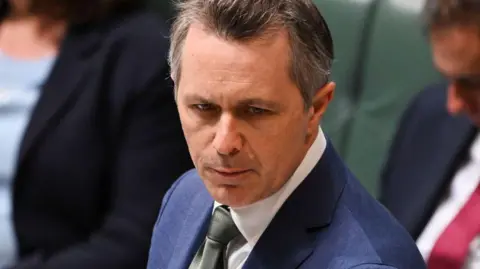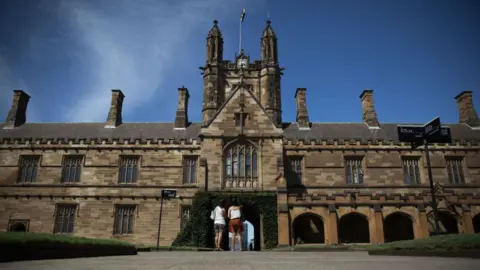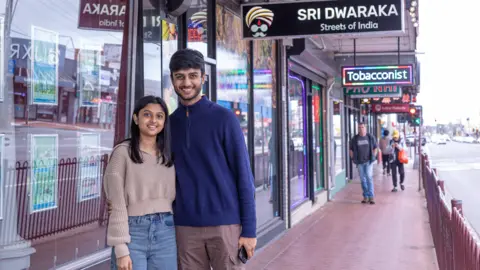 Anannyaa Gupta
Anannyaa GuptaFor Anannyaa Gupta completing her studies in Australia has always been the “dream”.
“Their education system is one of the best in the world,” the 21-year-old, from the Indian city of Hyderabad, explains.
After completing her bachelor’s degree at Melbourne’s Monash University in July, she applied for the master’s qualification she needs to become a social worker – the kind of skilled job Australia is desperate to fill amid labour shortages.
“I genuinely want to study here, offer my skills and contribute to society,” she says.
But Ms Gupta is among current and prospective international students who have been swept up in a panic caused by the Australian government’s plan to slash foreign student numbers.
The new cap – which would significantly reduce new enrolments – is needed to make the A$47.8bn (£24.6bn, $32bn) education industry more sustainable, the government says.
It is the most controversial of recent measures that have also imposed tougher English language requirements on student visa applicants, and greater scrutiny on those seeking further study. Non-refundable visa application fees have also been doubled.
However, the sector and its supporters say they weren’t properly consulted, and that the changes could ravage the economy, cause job losses and damage Australia’s reputation, all while punishing both domestic and international students.
“[It] sends out the signal that Australia is not a welcoming place,” says Matthew Brown, deputy chief executive of the Group of Eight (Go8), a body which represents Australia’s top ranked universities.
Education is Australia’s fourth biggest export, trailing only mining products. Foreign students, who pay nearly twice as much as Australian students on average, prop up some institutions, subsidising research, scholarships, and domestic study fees. At the University of Sydney, for example, they account for over 40% of revenue.
But Prime Minister Anthony Albanese’s government is facing pressure to reduce record levels of migration, in the hope of improving housing affordability and easing a cost-of-living crisis, ahead of a federal election next year. And international students – who totalled 793,335 last semester – have become a target.
The government has proposed to cap new foreign enrolments at 270,000 for 2025, which it says is a return to pre-pandemic levels. An accurate comparison with previous years is not possible because publicly available data is inadequate, according to an education expert.
Education Minister Jason Clare says each higher education institution will be given an individual limit, with the biggest cuts to be borne by vocational education and training providers. Of the universities affected, those in capital cities will see the largest reductions.
The government says the policy will redirect students to regional towns and universities that need them, instead of overcrowded big cities.
It also says the changes aim to protect prospective students from “unethical” providers, alleging some accept students without sufficient language skills or academic standards and enrol people who intend to work instead of study.
“International education is extremely important, and these reforms are designed to make it better and fairer, and set it up on a more sustainable footing going forward,” Clare said.
 Getty Images
Getty ImagesAbul Rizvi, a former government official who shaped Australia’s skilled migration policy, says the “underfunded” sector has “long been chasing tuition revenue from overseas students and sacrificing learning integrity in the process”.
Institutions themselves are questioning whether they’re too reliant on international student income and how to fix it, Dr Brown says: “It’s a discussion that every university is having.”
But the caps announcement still drew a mostly furious response from the sector.
The Go8 has called the proposed laws “draconian”, while others accused the government of “wilfully weakening” the economy and of using international students as “cannon fodder in a poll-driven battle over migration”.
The government has not confirmed how long the caps will be in place, but Dr Brown says the Go8’s calculations indicate they will have a A$1bn impact on their members in the first year alone. The broader economy would suffer a A$5.3bn hit, resulting in the loss of 20,000 jobs, according to their research.
Australia’s Department of the Treasury has called those projections “doubtful” but has not released its own modelling on the economic impact of the changes.
Dr Brown also warned that the caps could see some universities rescind offers already made to foreign students, strangle vital research programmes, and may mean an increase in fees for some Australian students.
 Getty Images
Getty ImagesHowever a handful of smaller universities, for whom the caps are beneficial, welcomed the news.
La Trobe University’s Vice-Chancellor Theo Farrell said they supported “transparent and proportionate measures” to manage international student growth in Australia.
“We recognise that there is broad political and community support to reduce net migration levels,” he said.
But Dr Brown argues there is also a hit to Australia’s reputation which is harder to quantify, pointing to Canada as a warning. It introduced a foreign student cap this year, but industry bodies there say enrolments have fallen well below that, because nervous students would rather apply to study somewhere with more certainty.
“We need an international education system that has managed growth built in… it’s not for the minister to unilaterally decide on caps based on some formula which satisfies a political end.”
Mr Rizvi argues that instead of going ahead with the proposed caps in Australia, the government should consider introducing a minimum university entrance exam score.
“We’re shooting ourselves in the foot… It won’t deter poor performing students but it will deter high performing students who have options,” he wrote on X.
Meanwhile in parliament, the Greens have said the policy amounts to “racist dog-whistling”, and one of the government’s MPs has broken ranks to attack it too.
“A hard cap would be bad for Australia’s human capital and the talent pipeline, bad for soft power and bad for academic excellence and research,” Julian Hill told The Australian newspaper.
But despite the criticisms, the bill legislating the limits – set to be debated in parliament this week – is expected to pass, with the opposition’s support.
Clare has acknowledged that some service providers may face difficult budget decisions but said that any assertion the policy is “somehow tearing down international education is absolutely and fundamentally wrong”.
However, with less than two months until the changes are supposed to take effect, they are causing extreme anxiety and confusion among students.
In China and India – the two biggest international markets for Australia – the news is going down like a lead balloon.
“This is going to be very hard on students in India, most of whom come from middle-income backgrounds and spend years planning and preparing for their education abroad. Their dreams will be quashed,” Amritsar-based immigration consultant Rupinder Singh told the BBC.
 Alessandro Russo/Monash University
Alessandro Russo/Monash UniversityVedant Gadhavi – a Monash University student – says that some of his friends back home in Gujarat who had been hoping to come to Australia for their masters have been spooked.
“They seem to have changed their plans a bit because of the constant shift… They thought that it might be a bit difficult to plan their careers and life.”
Jenny – a senior high school student in China’s Anhui province – says she set her sights on Australia because getting a good quality education there is “easier” than getting into a fiercely competitive Chinese university.
“It’s all up in the air now,” she tells the BBC.
She adds that going to a lower-ranked university in a regional location is not an option for her or her peers: “We [just] won’t go to Australia at all.”
Rishika Agrawal, president of the Australian National University’s International Students’ Department, says the proposed laws have stoked other uneasy feelings.
“Definitely there are other students who think this is a sign of increased hostility towards immigrants in Australia from the government.”
And, she adds, with the contributions to society made by international students often overlooked, while their post-graduate employment options dry up, there’s growing resentment.
“They go back to their own countries, having spent a tremendous amount of money towards their education and not really reaping the rewards for it.
“They definitely do feel like cash cows.”
As the debate continues in parliament, there’s been some relief for Anannya. Shortly after she spoke to the BBC, and only weeks out from her course start date, she received the official masters enrolment certificate and new study visa she feared would never come.
But many other students still wait and worry.
“If I were in their shoes, I’d feel very helpless, very disappointed. It’s already taking away credibility that Australia used to hold,” Rishika says.
Additional reporting by Fan Wang in Singapore and Zoya Mateen in Delhi.









